Note: Sefi Atta is WINNER of the Wole Soyinka Prize for Literature in Africa and WINNER of the Noma Award for Publishing in Africa.
“It is almost parental the way Deola considers what she can bring up about her experiences as a Nigerian in England. [She wants to tell her white friends in England that] Nigerians are as prejudiced as the English, and more snobbish. Nigerians, given any excuse, are ready to snub. Without provocation and even remorse. They snub one another, snub other Africans, other blacks and other races. Nigerians would snub aliens if they encountered aliens.”
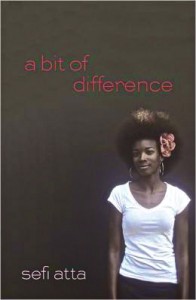 Deola Bello, a thirty-nine-year-old Nigerian expatriate who has been living in London since the 1980s, is now working for LINK, a non-profit charity which funds projects in Third World countries. Her London office is charged specifically with financing programs in Kenya, South Africa, and other African countries, and she, an auditor, travels back and forth investigating programs. She is about to travel “home” to Lagos on business for a week to report on two projects there, one of which is now applying for funding for the first time to help deal with the malaria problem, while the other, Widows in Need, is a program already in place, providing support for widows whose average age is, ironically, the same as her own. Her brief return to Lagos will coincide with the fifth anniversary of her father’s death, however, and the family memorial service and elaborate, long dinners commemorating his life will draw large numbers of family and friends.
Deola Bello, a thirty-nine-year-old Nigerian expatriate who has been living in London since the 1980s, is now working for LINK, a non-profit charity which funds projects in Third World countries. Her London office is charged specifically with financing programs in Kenya, South Africa, and other African countries, and she, an auditor, travels back and forth investigating programs. She is about to travel “home” to Lagos on business for a week to report on two projects there, one of which is now applying for funding for the first time to help deal with the malaria problem, while the other, Widows in Need, is a program already in place, providing support for widows whose average age is, ironically, the same as her own. Her brief return to Lagos will coincide with the fifth anniversary of her father’s death, however, and the family memorial service and elaborate, long dinners commemorating his life will draw large numbers of family and friends.
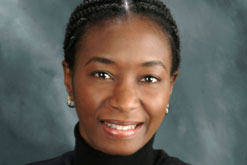 Deola is already prepared to deal with her mother and aunties regarding when she is going to return home permanently, when she is going to get married, and when she will be having children. They, of course, are more than ready to offer help, and she, of course, is just as ready to avoid it, believing that “marriage may be as banal and unsatisfying as her career.” The memorial dinner will bring her in touch with many people she has not seen for years, providing her an opportunity to see how much and in what ways they may have changed. Deola’s father was the founder and chairman of the Trust Bank in Lagos, and her brother is the deputy managing director. Her sister is a physician who has a retainership at the bank, and the family is well off, though not astoundingly wealthy. They vacation at Victoria Island, a beautiful beachfront area to which others of their class also go for the summer, and they can send their children to London for advanced schooling if they want.
Deola is already prepared to deal with her mother and aunties regarding when she is going to return home permanently, when she is going to get married, and when she will be having children. They, of course, are more than ready to offer help, and she, of course, is just as ready to avoid it, believing that “marriage may be as banal and unsatisfying as her career.” The memorial dinner will bring her in touch with many people she has not seen for years, providing her an opportunity to see how much and in what ways they may have changed. Deola’s father was the founder and chairman of the Trust Bank in Lagos, and her brother is the deputy managing director. Her sister is a physician who has a retainership at the bank, and the family is well off, though not astoundingly wealthy. They vacation at Victoria Island, a beautiful beachfront area to which others of their class also go for the summer, and they can send their children to London for advanced schooling if they want.
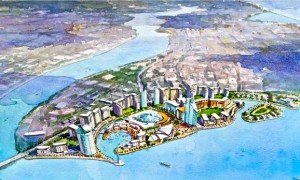
Victoria Island master plan for development
As author Sefi Atta tells about Deola’s extended family and their friends in minute detail, she creates a clear picture – the older married women who shop to avoid boredom and try to micromanage their children’s lives, the philandering husbands, the frustrated wives, and the children shuttled from parents to grandparents and back – all the ordinary situations one finds in reality, no matter where one lives. The big problem for this older generation, Deola believes, is that “Their contemporaries are dying; their society has been replaced by one they could call vulgar…Semi-illiterates are running the country, which they see slipping out of their grip and they are hanging on to whatever they can, their children, mostly…Even if they are wealthy, Nigeria does not belong to them anymore.”
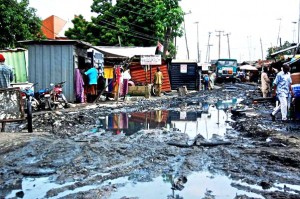
The hidden side of Victoria Island.
With the focus on the small, the specific, and the individual, as these details relate to the general state of middle-class life in Lagos, the author shows how these characters compare and contrast with those Deola sees in London, who are also described in the same kind of detail as they try to communicate with each other and the outside world. In paying such close attention to “Who are we, really?” this book feels quite different from other books set in Nigeria. Atta is far less interested in using a story to illustrate universal themes or endemic problems than she is in looking at her characters’ lives through a magnifying glass, describing what she sees (without editing all the plebeian details) and allowing the reader to share the point of view of Deola, the character who is making the observations.
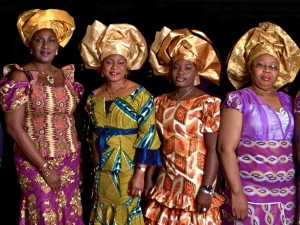
Yoruba women
As a result, there is almost no plot here, with the author making little direct attempt to relate the characters to particular political, medical, or economic crises in Nigeria. Though HIV/AIDS and corruption are mentioned as part of the background and setting, they are not a significant aspect of the novel’s structure. “The only people who claim they are not corrupt have not had an opportunity to be corrupt, which is why they complain. They feel cheated in the midst of all the corruption around them,” Deola comments, in passing, before moving on to different matters. As she travels back and forth to Atlanta, Lagos, India, and back to London, doing her job, she meets people, visits with friends, and describes their lives and backgrounds, showing how cultural differences among groups within a country can have as much effect on a character’s behavior in England as they do in Nigeria. The Yoruba behave differently from the Ikoyi, just as British young people behave differently depending on their schools, social groups, and neighborhoods, even acquiring different accents so they will be identified more closely with particular groups. As a result, Atta’s “story” develops from the inside out, instead of feeling dependent upon the structural requirements of Introduction, Rising Action, Climax, and Denouement. These elements, though present in an oblique way, develop here as a direct response to what is happening within the characters and through their often accidental interactions.

President of Nigeria, Goodluck Jonathan
The author’s experience as a dramatist is obvious in the clarity of her prose and in her ear for dialogue and dialect, making the picture of Deola as she muddles through her life easy for the reader to empathize with and understand. In the conclusion, however, the author turns a seemingly simple interaction into a grand finale by imposing a sense of control and completion that feels a bit artificial, as if it comes from the author, not the characters. Though the author allows the complexities of human emotions to play out, without necessarily “tying things up in a bow,” the twists at the end do feel more contrived than the rest of the action throughout, the hand of fate being rather heavy here. Still, this novel, overall, with its wit and sharply observed commentary, offers a picture of Nigeria from a unique point of view, one which many readers will find refreshingly honest.
Photos, in order: The author’s photo is from http://www.bbc.co.uk
The plan for the Victoria Island waterfront appears on http://archinect.com
The “other side” of Victoria Island may be seen on http://lolaakinmade.com
The Yoruba women, pictured, are part of a choir, seen here: http://www.jnight.org
The photo of President Goodluck Jonathan is found here: http://www.punchng.com
ARC: Interlink
